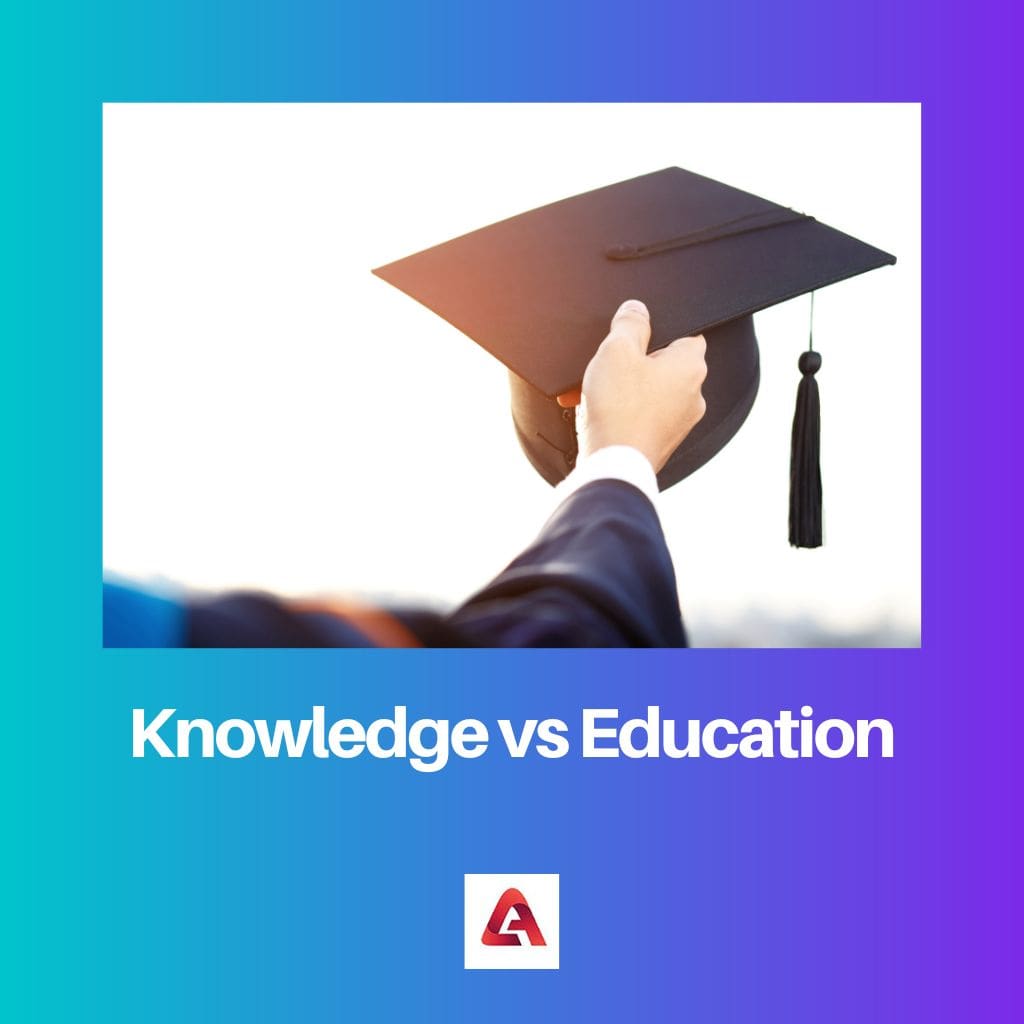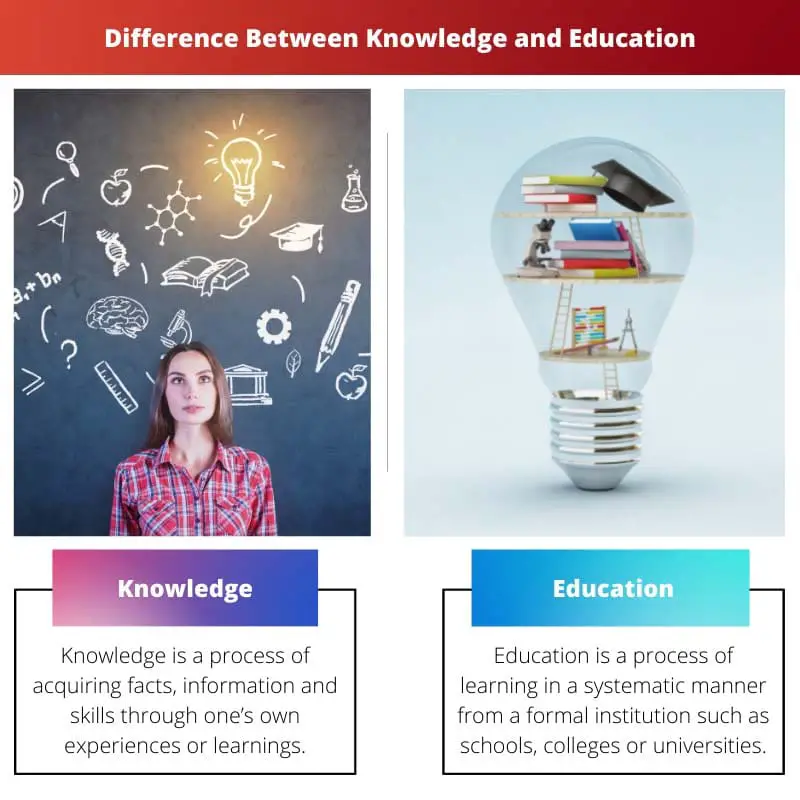Knowledge and education do not have much difference between them as both of them are correlated to each other. If we go by facts, knowledge is an informal experience, whereas education is a formal process.
Knowledge is to be gained by one’s self-efforts.
Key Takeaways
- Knowledge is the understanding and awareness of facts, information, concepts, or skills acquired through experience, study, or instruction.
- Education is a process by which individuals acquire knowledge, skills, values, and attitudes through instruction, training, or study, in a structured setting such as a school or university.
- Both knowledge and education are related to learning and personal development. Still, knowledge refers to the accumulated understanding and awareness of information, while education is the process through which knowledge is acquired and developed.
Knowledge vs. Education
Knowledge is gaining information through learning and practice. The process of gaining knowledge is unlimited. A person can always learn from his/her life experiences. There are no rules in knowledge. Education is a process of developing skills through learning in a formal institute. Education can be gained from a particular institute for a specific time. Rules are defined in education.

Knowledge is gained from good education, peers, extensive reading, consultations, and life experiences. Education can be described as a process of gaining knowledge for its practical application later in life.
Also, one gets an education when teachers teach it to their students.
On the other hand, knowledge is acquired by oneself; in other words, it is self-driven. By going through the process of learning and gaining education, one gets to know many facts, theories, and ideas.
When that person applies the facts and theories he learned in real-life situations, this application is knowledge.
Comparison Table
| Parameters of Comparison | Knowledge | Education |
|---|---|---|
| Definition | Knowledge is acquiring facts, information, and skills through experiences or learning. | Education is a process of learning systematically from a formal institution such as a school, college, or university. |
| Places to gain | Knowledge has no boundaries as it is learned from experiences and real-life situations. | Education can only be gained from formal institutions like schools, colleges, or universities. |
| Rules | There are no instructions, rules, or limitations to gaining knowledge. | There are defined rules, regulations, and curricula to acquire education. |
| Method | Knowledge is free to gain from the surroundings and life experiences. | Education is to be learned from books and teachers in a formal institution. |
| Growth | Knowledge has no age limit or growth rate. It is solely based on one’s understanding of his life. | Education grows with age as a person can learn more and more by joining courses. |
What is Knowledge?
Knowledge is acquiring facts, information, and skills through experiences or learning. It is an everyday experience.
Knowledge is to be gained by self-efforts and experiences; in other words, it is self-driven. It is gained from good education, peers, extensive reading, consultations, and life experiences.
When an educated person applies what he has learned in real-life situations, it is knowledge. There is no knowledge that cannot be experienced; what one experiences and understands makes one more knowledgeable.
It is about understanding a specific fact, analyzing the raw information, and developing skills accordingly.
Knowledge has no age limit or growth rate. It is solely based on one’s understanding of his life.
Sometimes, a child can also be more knowledgeable than an adult. Knowledge does not need any systems or institutions; it is free to be gained by anyone who wants to learn.

What is Education?
Education is a process of learning systematically from a formal institution such as a school, college, or university. It is a formal process.
There are defined rules, regulations, and curricula to acquire education. It helps an individual to realize his talents and weakness and to increase his self-potential.
Also, education can be described as gaining knowledge for its useful application later in life. It is something that one gets when teachers teach it to their students.
Education grows with age as a person can learn more by joining many courses or reading and learning books.
As long as a person desires to learn, his education keeps growing. Some education is of a kind that can never be experienced and can only be gained from a book.
Education is more specific and defined than knowledge. It is a system with learnings related to specific age groups and people.

Main Differences Between Knowledge and Education
- There are no instructions, rules, or limitations to gaining knowledge, while in the case of education, there are defined sets of rules, regulations, and curricula to acquire it.
- Knowledge has no boundaries as it is learned from experiences and real-life situations, whereas education can only be gained from a formal institution like a school, college, or university.
- Knowledge has no age limit or growth rate. It is solely based on one’s understanding of his life. On the other hand, education grows with age as a person can learn more and more by joining courses and increasing his knowledge of a subject.
- Knowledge is free to gain from the surroundings and life experiences, whereas education is to be learned from books and teachers in a formal institution.


This article is a great resource for students and educators alike who want to understand the distinction between knowledge and education.
It’s refreshing to read such well-articulated content on the topic of knowledge and education.
The article provides a clear distinction between knowledge and education, and I think it gives a good understanding of the two concepts. Well done!
I found the section on the main differences between knowledge and education to be particularly insightful.
I agree, the examples provided were very helpful in understanding the differences between knowledge and education.
The article presents a comprehensive breakdown of the distinctions between knowledge and education, making it an informative read.
The author effectively demonstrates the distinction between knowledge and education through comprehensive explanations and real-life examples.
I agree, and the real-life examples help bridge the gap between theoretical concepts and practical understanding.
The article is a well-structured and thought-provoking piece that offers valuable insights into the nature of knowledge and the process of education.
I appreciate the way the author navigates through the complexities of knowledge and education while maintaining a clear and engaging narrative.
The article’s comparison table helps illustrate the key differences between knowledge and education concisely and effectively.
I appreciate the way the article presents complex ideas in such a clear format through the comparison table.
I think the article effectively highlights the nuances between knowledge and education, and the comparison table is particularly useful for clarity.
I believe the article does justice to the complexity of defining knowledge and education, and it provides valuable insights into both concepts.
The differentiation between knowledge and education is well-argued and logically explained by the author.
The author’s elaboration on the definitions of knowledge and education was both engaging and informative.
The article’s breakdown of what knowledge is and what education entails was well-structured and easy to follow.
I respectfully disagree with the author’s claim that knowledge is solely self-driven. Education can also contribute significantly to one’s knowledge.
I agree with Urobinson, the article aims to emphasize how knowledge and education are related rather than mutually exclusive.
I see your point, but I think the focus of the article is to highlight the differences rather than the exclusivity of knowledge and education.
The author’s explanation of the parameters of comparison between knowledge and education was enlightening and well-analyzed.
I found the explanation of the growth differences between knowledge and education to be particularly insightful.
I share the same sentiment, and I believe the clarity provided in the article is commendable.